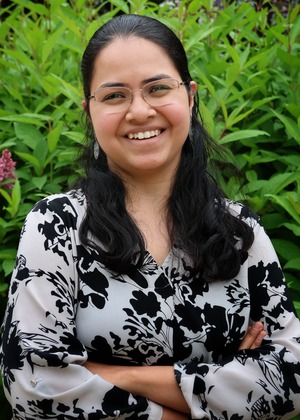Dr. Aathmaja Anandhi Rangarajan
Dr. Aathmaja Anandhi Rangarajan is a postdoctoral fellow in MGI who works in Dr. Chris Waters' lab. Here are her answers to the Micro Biography questions:

How and when did you become interested in the field(s) of microbiology, genetics, and/or immunology?
I became interested in Biology in general during High School. I joined an undergraduate
course in Microbiology where in I became interested in Genetics and Molecular Biology
and wanted to pursue research as a career to discover principles of biological processes.
However, I didn’t know what being a researcher was like until then. After earning
my undergraduate degree, I did a Masters in Genomics and did a project about translational
fidelity using genetics tools in E.coli which helped me gain research experience and
opened me to the fascinating world of microbial genetics. I then pursued my PhD on
transcriptional repression in E.coli at University of Cologne, Germany and have continued
to work on different aspects of microbial genetics using variety of microbes.
Were there any particular people or events who were influential in your journey?
Prof. Hussain Munavar, who taught me Microbial Genetics during my masters, introduced me to the fascinating field of microbial genetics and the elegant experiments used to understand basic biological processes. I think that taking his classes and doing thesis work in his lab made me deeply interested in microbial genetics and ignited my passion for doing research.
How did you come to be a part of this department?
I wanted to postdoc with Prof. Chris Waters after I graduated. However, he did not have a place available in his lab at the time. In the meantime, I was accepted as a postdoc in Prof. Julie Biteens lab at University of Michigan with whom I worked on gut microbial interactions. Luckily, as I was completing my project there, a postdoc position opened in Chris’s lab, and I was selected for it. I also wanted to come to MSU for personal reasons, as my husband was also working as a postdoc here, and we wanted to stay close to work.
What is your main research area right now and why is it important?
I am working on an important signaling molecule called cyclic di-GMP in V. cholerae that causes diarrheal disease. It is not only present in V. cholerae but in most of the bacterial species. Cyclic di-GMP plays a crucial role in making the bacteria decide between motile and sessile (moving and stationary) lifestyles. I’m trying to understand how this molecule is regulated and the signals that the bacteria senses to switch their lifestyles through cyclic di-GMP.
How do you see your research evolving?
My research is evolving well and is creating more questions than answers, like with any project. I hope to explore some of them in future.
What types of activities are you involved in outside of research?
I have a 9-month-old baby and a 4 year old toddler, so most of my time outside of research goes into taking care of and engaging with them. I have started going to a dance-based fitness class once a week, which I am enjoying. I think taking an hour for myself outside of my home and research and engaging my brain and body differently definitely helps me maintain my physical and mental sanity.
Is there anything else you’d like to share?
The postdoc phase can be isolating, and I think it's important to engage in departmental seminars and other activities. Getting to know about diverse projects helps to broaden your knowledge and might help you find ideas for your work. Though it is uncommon for postdocs, I would also suggest having a mentoring committee other than your PI to help reviewing your progress as a postdoc. Most importantly you should not compare yourself with peers as everybody’s path and challenges are unique.
What is next for you?
I hope to get a tenure track faculty position and start my own research lab one day. I am trying to equip myself in all aspects to get there. As a woman and an immigrant, I am also aware of challenges that come along with these identities to secure an independent position. However, I am fortunate to have an amazing PI and departmental mentors who are as invested in my career goal as I am, and I also see women from diverse backgrounds doing well in science which gives me confidence that I can get there one day.